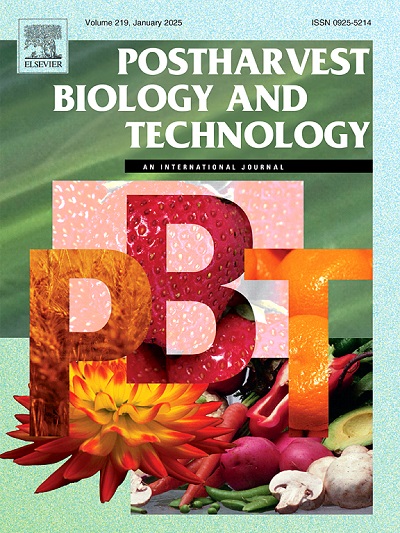MaERF9和MaERF113转录因子通过调控采后香蕉果实的膜脂代谢参与冷损伤的形成
IF 6.4
1区 农林科学
Q1 AGRONOMY
引用次数: 0
摘要
香蕉是一种对冷敏感的水果,易受冷害(CI),引起褐变、点蚀,甚至异常成熟,导致品质下降和经济损失。香蕉果实的 CI 发生是由膜完整性损伤引起的,与膜脂代谢途径的酶和遗传操作有关。乙烯反应因子(ERF)转录因子(TFs)在膜脂介导的冷敏性水果(如香蕉)CI发育过程中的参与程度仍不清楚。本研究发现,冷处理增加了 CI 指数、细胞膜通透性和 MDA 含量,降低了色调角(h°)值。冷处理上调了膜脂代谢基因的表达,包括 MaDGK、MaPLA、MaLipase 和 MaLOX。此外,两个香蕉ERF TFs(MaERF9和MaERF113)也受到冷环境的诱导,并表现出转录激活活性。此外,电泳迁移试验(EMSA)和瞬时表达分析表明,MaERF9和MaERF113直接与MaDGK、MaPLA、MaLipase和MaLOX启动子中的GCC-box元件结合,并激活了它们的表达。这些发现意味着 MaERF9 和 MaERF113 通过影响膜脂代谢参与了香蕉果实的 CI 发育。总之,我们的研究结果为研究调控香蕉果实CI发育的转录调控网络提供了新的视角。本文章由计算机程序翻译,如有差异,请以英文原文为准。
MaERF9 and MaERF113 transcription factors involve in chilling injury development by regulating membrane lipid metabolism of postharvest banana fruit
Banana is a cold-sensitive fruit, which exhibits vulnerability to chilling injury (CI), causing browning, pitting, even abnormal ripening, resulting in quality deterioration and economic loss. CI development of banana fruit was caused by membrane integrity damage and was related to the enzymatic and genetic manipulation of membrane lipid metabolism pathway. The involvement of Ethylene Response Factor (ERF) transcription factors (TFs) in membrane lipid-mediated CI development of cold-sensitive fruit, such as banana, remains largely unknown. In this study, we found that cold treatment increased CI index, cell membrane permeability and MDA content, decreased hue angle (h°) value. The expressions of membrane lipids metabolism genes, including MaDGK, MaPLA, MaLipase and MaLOX, were upregulated by cold treatment. Also, two banana ERF TFs, designated as MaERF9 and MaERF113, were induced by cold environment and displayed transactivation activities. Additionally, the electrophoretic mobility shift assay (EMSA) and transient expression analysis showed that MaERF9 and MaERF113 directly bound to the GCC-box elements in the promoters of MaDGK, MaPLA, MaLipase and MaLOX, and activated their expressions. These findings imply that MaERF9 and MaERF113 involved in CI development of banana fruit, via affecting membrane lipid metabolism. Collectively, our results provide new insights into the transcriptional regulation network regulating CI development of banana fruit.
求助全文
通过发布文献求助,成功后即可免费获取论文全文。
去求助
来源期刊

Postharvest Biology and Technology
农林科学-农艺学
CiteScore
12.00
自引率
11.40%
发文量
309
审稿时长
38 days
期刊介绍:
The journal is devoted exclusively to the publication of original papers, review articles and frontiers articles on biological and technological postharvest research. This includes the areas of postharvest storage, treatments and underpinning mechanisms, quality evaluation, packaging, handling and distribution of fresh horticultural crops including fruit, vegetables, flowers and nuts, but excluding grains, seeds and forages.
Papers reporting novel insights from fundamental and interdisciplinary research will be particularly encouraged. These disciplines include systems biology, bioinformatics, entomology, plant physiology, plant pathology, (bio)chemistry, engineering, modelling, and technologies for nondestructive testing.
Manuscripts on fresh food crops that will be further processed after postharvest storage, or on food processes beyond refrigeration, packaging and minimal processing will not be considered.
 求助内容:
求助内容: 应助结果提醒方式:
应助结果提醒方式:


